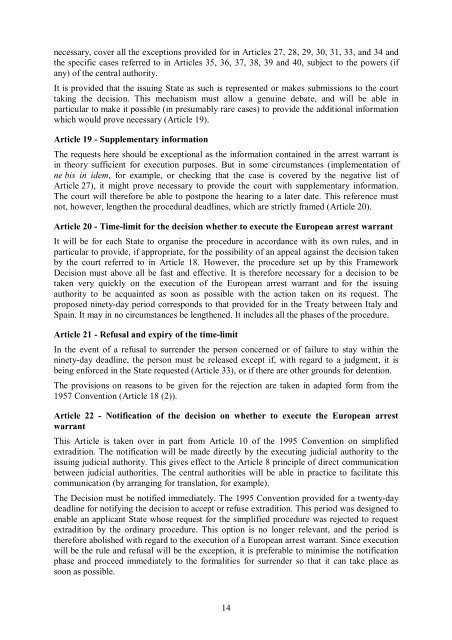the European arrest warrant - Statewatch
the European arrest warrant - Statewatch
the European arrest warrant - Statewatch
Create successful ePaper yourself
Turn your PDF publications into a flip-book with our unique Google optimized e-Paper software.
necessary, cover all <strong>the</strong> exceptions provided for in Articles 27, 28, 29, 30, 31, 33, and 34 and<br />
<strong>the</strong> specific cases referred to in Articles 35, 36, 37, 38, 39 and 40, subject to <strong>the</strong> powers (if<br />
any) of <strong>the</strong> central authority.<br />
It is provided that <strong>the</strong> issuing State as such is represented or makes submissions to <strong>the</strong> court<br />
taking <strong>the</strong> decision. This mechanism must allow a genuine debate, and will be able in<br />
particular to make it possible (in presumably rare cases) to provide <strong>the</strong> additional information<br />
which would prove necessary (Article 19).<br />
Article 19 - Supplementary information<br />
The requests here should be exceptional as <strong>the</strong> information contained in <strong>the</strong> <strong>arrest</strong> <strong>warrant</strong> is<br />
in <strong>the</strong>ory sufficient for execution purposes. But in some circumstances (implementation of<br />
ne bis in idem, for example, or checking that <strong>the</strong> case is covered by <strong>the</strong> negative list of<br />
Article 27), it might prove necessary to provide <strong>the</strong> court with supplementary information.<br />
Thecourtwill<strong>the</strong>reforebeabletopostpone<strong>the</strong>hearingtoalaterdate.Thisreferencemust<br />
not, however, leng<strong>the</strong>n <strong>the</strong> procedural deadlines, which are strictly framed (Article 20).<br />
Article 20 - Time-limit for <strong>the</strong> decision whe<strong>the</strong>r to execute <strong>the</strong> <strong>European</strong> <strong>arrest</strong> <strong>warrant</strong><br />
It will be for each State to organise <strong>the</strong> procedure in accordance with its own rules, and in<br />
particular to provide, if appropriate, for <strong>the</strong> possibility of an appeal against <strong>the</strong> decision taken<br />
by <strong>the</strong> court referred to in Article 18. However, <strong>the</strong> procedure set up by this Framework<br />
Decision must above all be fast and effective. It is <strong>the</strong>refore necessary for a decision to be<br />
taken very quickly on <strong>the</strong> execution of <strong>the</strong> <strong>European</strong> <strong>arrest</strong> <strong>warrant</strong> and for <strong>the</strong> issuing<br />
authority to be acquainted as soon as possible with <strong>the</strong> action taken on its request. The<br />
proposed ninety-day period corresponds to that provided for in <strong>the</strong> Treaty between Italy and<br />
Spain. It may in no circumstances be leng<strong>the</strong>ned. It includes all <strong>the</strong> phases of <strong>the</strong> procedure.<br />
Article 21 - Refusal and expiry of <strong>the</strong> time-limit<br />
In <strong>the</strong> event of a refusal to surrender <strong>the</strong> person concerned or of failure to stay within <strong>the</strong><br />
ninety-day deadline, <strong>the</strong> person must be released except if, with regard to a judgment, it is<br />
being enforced in <strong>the</strong> State requested (Article 33), or if <strong>the</strong>re are o<strong>the</strong>r grounds for detention.<br />
Theprovisionsonreasonstobegivenfor<strong>the</strong>rejectionaretakeninadaptedformfrom<strong>the</strong><br />
1957 Convention (Article 18 (2)).<br />
Article 22 - Notification of <strong>the</strong> decision on whe<strong>the</strong>r to execute <strong>the</strong> <strong>European</strong> <strong>arrest</strong><br />
<strong>warrant</strong><br />
This Article is taken over in part from Article 10 of <strong>the</strong> 1995 Convention on simplified<br />
extradition. The notification will be made directly by <strong>the</strong> executing judicial authority to <strong>the</strong><br />
issuing judicial authority. This gives effect to <strong>the</strong> Article 8 principle of direct communication<br />
between judicial authorities. The central authorities will be able in practice to facilitate this<br />
communication (by arranging for translation, for example).<br />
The Decision must be notified immediately. The 1995 Convention provided for a twenty-day<br />
deadline for notifying <strong>the</strong> decision to accept or refuse extradition. This period was designed to<br />
enable an applicant State whose request for <strong>the</strong> simplified procedure was rejected to request<br />
extradition by <strong>the</strong> ordinary procedure. This option is no longer relevant, and <strong>the</strong> period is<br />
<strong>the</strong>refore abolished with regard to <strong>the</strong> execution of a <strong>European</strong> <strong>arrest</strong> <strong>warrant</strong>. Since execution<br />
willbe<strong>the</strong>ruleandrefusalwillbe<strong>the</strong>exception,itispreferabletominimise<strong>the</strong>notification<br />
phase and proceed immediately to <strong>the</strong> formalities for surrender so that it can take place as<br />
soon as possible.<br />
14
















